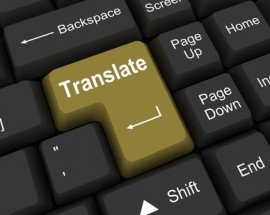
Although there are many, many advantages of working as a freelance translator, it is not always a bed of roses. Common constraints imposed on freelancer translators include the necessity of communicating with agencies and securing regular work from them.
So, what are agencies looking for in a freelance translator? This article gives you tips on what agencies expect from freelance translators and on how to survive as a freelance translator when relying on agency work.
1. Education
A candidate for translation work will impress an agency with a good general standard of education. A degree is generally thought of as evidence of a good standard of education, but you should never get complacent because agencies will literally have thousands of candidates to choose from. You need to think, ‘what distinguishes me from all the other candidates?’ and convey this clearly, logically and precisely in any communications with agencies. Spend time developing your CV professionally as when dealing with an agency, you will almost certainly need a CV to summarize your skills and get your message across in the right way.
2. Practice makes perfect: updating language skills
One important thing is being able to demonstrate your skills as current, and updated. Language skills in particular can quickly get outdated. Moreover if you have not practiced your French properly in three years, you may not be as fluent as you thought you were. Language skills require regular practice, preferably in a native setting and if you can demonstrate that you understand this, you will impress.
3. The value of the native speaker
For agencies, fluency to a native speaker standard is frequently sought after, so if you are fluent in a language, why not aspire to achieve the same level of fluency of a native speaker through regular practice with native speakers.
4. Speculative application versus targeted applications
Targeted applications to an agency are so much better than speculative ones. Instead of picking 20 agencies at random, why not search resources like jobs databases to identify those agencies that are recruiting?
5. Contact details
Include a mobile number and an email address as standard. Ensure your mobile is set so that it can receive voicemail and that international roaming functions are working.
6. Flexibility
Flexibility is something that always impresses an agency. If you can accommodate smaller jobs, this will generally build trust and pave the way to bigger and more well paid tasks. An agency will be reluctant to engage you for those bigger tasks if they have absolutely no experience of working with you.
7. Reliability
Be reliable. Always. You know why. If you can’t meet a deadline, explain this promptly and suggest an alternative course of action.
8. Contact names
When speaking to an agency for the first time, it is a good idea to get the name of the person you first dealt with, as then you won’t have to explain everything from the beginning if you have to follow up any past communications.
9. Planning
Planning is a skill that agencies offering translation work will be looking for. Translation work involves tight deadlines and juggling different projects at once. If you can show you are a good planner, and are organized, then you will impress an agency.
10. Coping with different time zones
If you are dealing with an agency for the first time, make sure you are aware of the pitfalls of working to deadlines within different time zones. This can be an organizational challenge, so make sure you are prepared for this and don’t make time zone mistakes. Why not get a watch which shows different time zones?
Neil Payne, formerly of Kwintessential, started off working life as a Turkish to English translator. It made his head hurt so he set up the company Commisceo Global instead. The company specialises in helping businesses “going global” through a number of localisation and translation services.









Good post Neil, thank you for sharing your tips. I would add another point, namely experience (probably the longer the better). Could you tell us if there’s anything particular that agencies are looking for in terms of experience?
I will save the answer for our next guest post here which is going to be about “the perfect CV” 🙂
Looking forward your opinion about the perfect CV…Wondering how to balance completeness vs concision after decades as engineer and 1 decade as translator…:-) My approach? 3 lines to report my life as engineer but 3 (three!) pages to tell about the translations I have been working on since 2002:-)
Best Regards, and congrats about your article,
Hilton
Hello Hilton,
In my opinion a CV shouldn’t be an extensive list of work done. (In general, you are offering a service, not applying for employment, so a “business profile” might be more suitable.)
Besides, I don’t think a 4-page CV is the most effective way to impress. How many PMs do you think would actually read it all?
Do you think that in case you choose the most important/relevant projects in your top 3 main fields and create max. 2-page CV, it wouldn’t work?
Tomas
Hi Tomas,
Thank you for sharing your comments raising the point I have always been wondering about. Actually, when I am trying to get some agency attention I simply select on or two translations previously made from my CV, for instance, last week I did send the following for a potential client (precisely on my 2003 doctoral dissertation subject:
From my CV:
> Sludge Treatment and Disposal (p1167−p1409); reference on this in http://tinyurl.com/pdfj9n and co-author of Chapter 53, Land Application of Sewage Sludge (p1328−p1367) in Biological Wastewater Treatment in Warm Climate Regions 2v. DESA (UFMG) and IWA (ISBN: 84339 002 7; 84339 107 4), 2005
> Co-author and co-editor of the water reuse book ‘Reúso de Água’, 579pp ISBN 85204-1450-8.
Of course, those 3 pages (4 is the one in Portuguese-BR) is far from comprehensive after working since 2002 doing translations. However, thanks to today’s desktop tools (I use Copernic) sometimes I find more pertinent examples to show my abilities in my HD! So, the practicality to downsize my CV’s extent from 3 to 2 pages still puzzles me, may not yield better results. I hope the hypothetical PM would either use CTRL+F to find whether 2 or 3 synonyms of what he needs were covered by me in the past or just glance through the subtitles in red…
Best,
Hilton
Hi Hilton!
I was just browsing and suddenly bumped into your comment about CVs. I worked for a cement company here in Argentina and I really enjoyed the translation of environmental issues. Are you actually translating for a cement company?
What happened to me is that by the time I worked in the company, my translations were rather “domestic”, from paper to the computer so I could never get the originals to backup my translations. Almost ten years and no trace of my work.
Anyway, just a comment. Bye!
Hello Everyone,
Excellent post. This is a good and useful article. This article gives you some tips on what agencies expect from freelance translators and on how to survive as a freelance translator when relying on agency work. Thanks for sharing….
Hi! Great post – I would also like to add the value of certifications. I know that Language Testing International (a partner of ACTFL) offers language testing certifications for you to put on your CV to prove your fluency. I can assume that this is beneficial for anyone who wants to vamp up their CV and have more than just a degree to show for their language skills! http://www.profluentplus.com